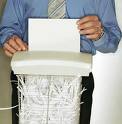Even during this electronic age we continue to accumulate mounds of paper. As the tax season draws to a close, now would be a good time to sort, organize and purge your financial papers. Go through your current filing system and shred old documents, but keep what is necessary.
Establish a permanent/long-term paper filing system that is used occasionally. This could be put away in storage. I will be putting away my 2013 tax documents and the accompanying receipts in my long-term storage and I will take out and shred the tax info from 2006.
Of course, I have a go-to daily filing system. I find that a metal filling cabinet with hanging file folders, with tabbed folders within those folders, is best for this sort of system.
Here are some tips on how to file your papers.
Shred after one month:
- ATM and bank deposit slips, after you’ve recorded the amounts in your check register and checked them against
 your monthly bank statement (unless you deduct something as a business expense).
your monthly bank statement (unless you deduct something as a business expense). - Credit card receipts, after you’ve checked to make sure the item appears correctly on your monthly statement (unless you deduct something as a business expense).
- Sales receipts for minor purchases, after you’ve satisfactorily use the item and if it has no warranty.
Shred after one year:
- Monthly bank and credit card statements (if you don’t itemize deductions—otherwise, keep with other tax documents)
- Monthly or quarterly brokerage and mutual fund statements, after you have reconciled them with your year-end summary.
- Monthly mortgage statements, as long as your year end statement clearly shows the total amount you’ve paid in interest and property taxes over the course of the year.
- Phone and utility bills (as long as you don’t have an at-home office, use your phone for business calls (save with other tax documents), or anticipate any need to prove long term residency).
- Paycheck stubs, after you’ve reconciled them with your annual W-2 or 1099 forms.
Retain for seven years:
- Your annual tax returns.
- W-2 AND 1099 forms .
- Year-end statements from credit card companies.
- Phone and utility bills (only if you deduct any portion for business expenses, have more than one home, or have moved within the past few years).
- Canceled checks, receipts or statements for:
- annual mortgage interest and property taxes
- deductible business expenses
- child-care bills
- out of pocket medical expenses
- any other tax-deductible expense (e.g.: donations).
Keep indefinitely:
- Your year-end summaries from financial-service companies.
- Confirmation slips that list the purchase price of any investments you own.
- Home improvement records.
- Receipts for major purchases (any item whose replacement cost exceeds the deductible on your homeowners or renters’ insurance policy.
- Beneficiary designations*.
Put papers that are no longer relevant into banker’s boxes or plastic file boxes (that hold hanging files)  and put them away into long-term storage. You can find the plastic file boxes at Staples and other office supply stores.
and put them away into long-term storage. You can find the plastic file boxes at Staples and other office supply stores.
Consider using a scanner and digital filing system. You can scan receipts, business cards, and also documents. Typically, the software included with the scanner identifies and extracts the important information from the receipts and automatically organizes it for you.
You might be that person who needs to Publication 552 the IRS publication on which records to keep.
Now you can set up a daily paper management system. You might want to get a professional organizer to help with this project. You may want to scan in many of your documents and get rid of the hard copies. (Printed PDF files are acceptable documents for the IRS.) Once your system is in place, you need to consistently dedicate about 5-30 minutes each day to keep it running smoothly.
Determine when is the best time for you to manage your financial papers.
• First thing in the morning: It’s a nice start to the day and helps you prioritize today’s tasks.
• At the end of the day: This gives you closure at the end of the day and lets you jump right into action the next day.
• Immediately as papers enter your home or office: This is good for those who just want to get it done ASAP.**
*Excerpted material from Deciding Which Financial Records to Keep by Diane Harris
** Excerpted material from Time 2 Organize’s Articles on Demand by Sara Pedersen Article also based on information from Catherine M. Williams, vice president for financial literacy at the credit-counseling firm Money Management International.


Follow Us!